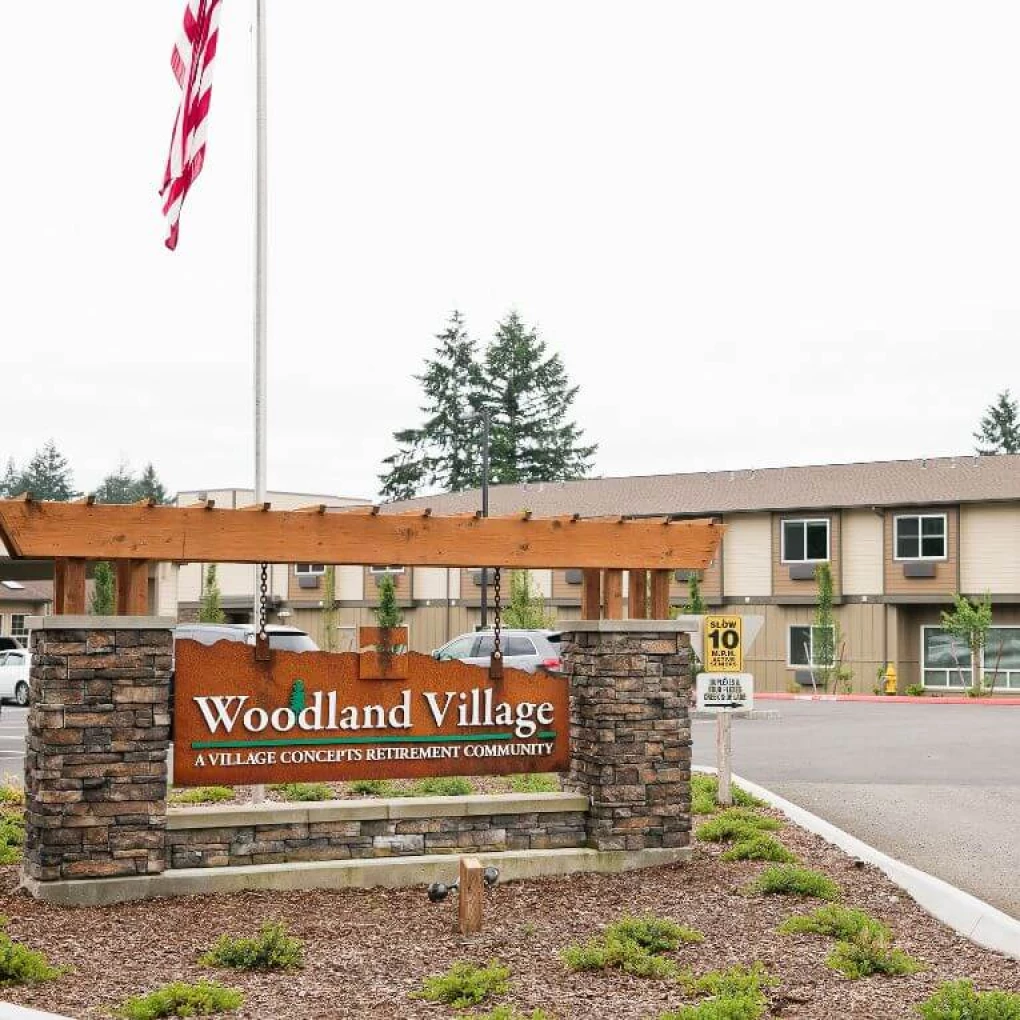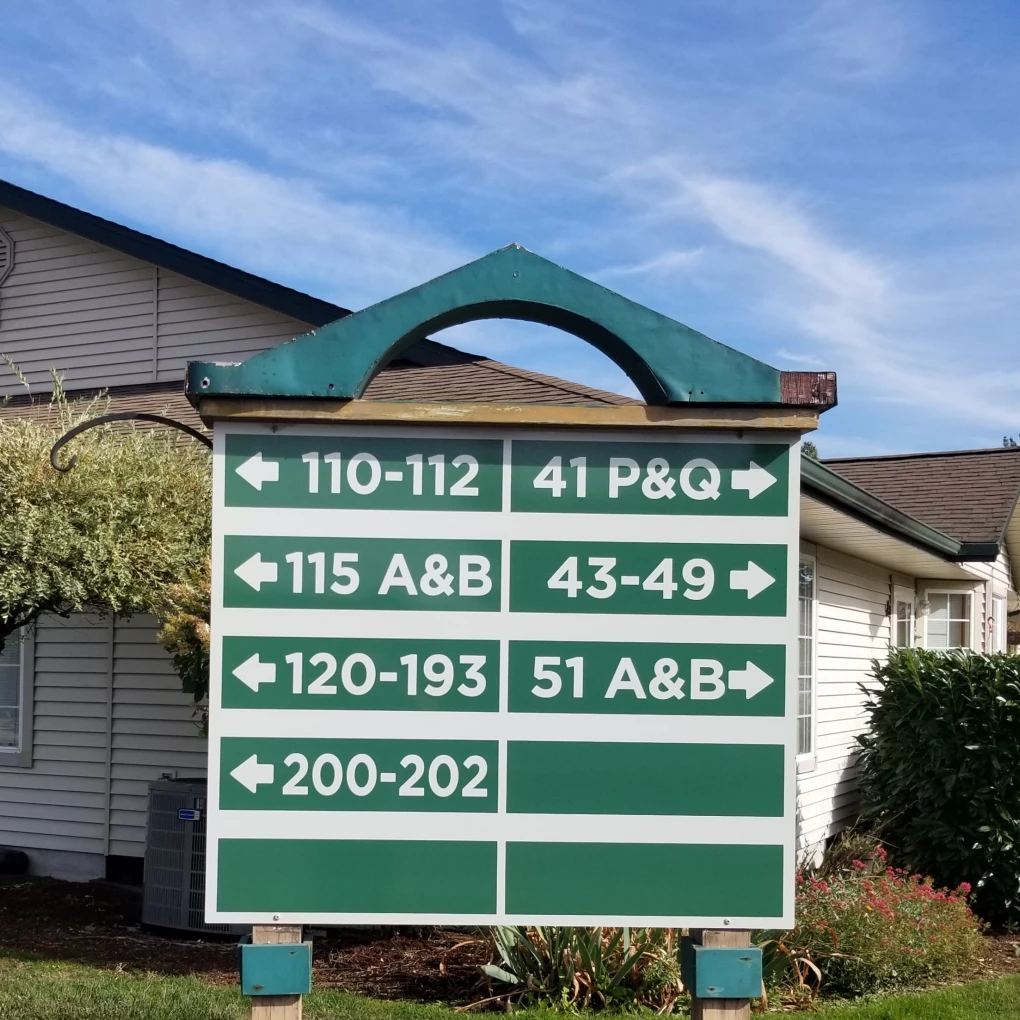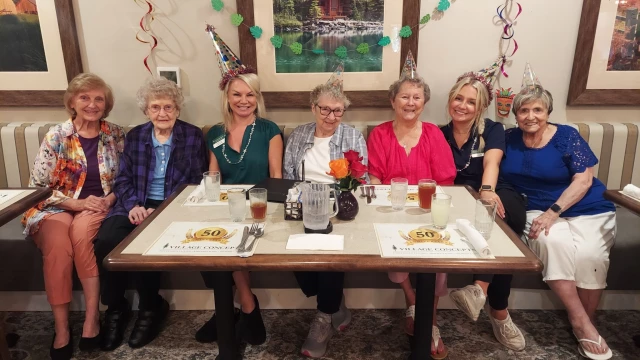Woodland Village in Chehalis celebrated the lives of eight centenarians on Monday. Ahead of the celebration, The Chronicle was able to interview four of them as they reflected on their more than 100 years of life and shared their experiences.
Louise Carpenter, 100, was born on April 15, 1922, in Bellingham. She grew up on a “little” farm in Snohomish County. In Carpenter’s telling, her childhood was a simple one.
“I didn’t do very much,” she said.
Carpenter recalled what it was like when her family first got electricity on their farm when she was 7 years old.
“I can remember when we got electricity because I was in awe of the electric light,” Carpenter recalled.
When the Great Depression began in 1929, Carpenter said her family learned to deal with the new economic realities.
“Well, we just did without,” Carpenter said. “I don’t remember suffering much, but we didn’t need much.”
After World War II began in late 1941, Carpenter began working in the shipyards of Puget Sound as a sheet metal worker. As the war progressed, she was given the opportunity to learn how to fly.
“It was really exciting to me,” Carpenter said. “We had to go to Spokane because there was no flying on the West Coast because of the war.”
After the war ended in 1945, Carpenter got a job as an aircraft communicator at the airport in Toledo, where she lived for 50 years. Carpenter managed to live a remarkably independent life well into her later years, living on her own until she moved to Woodland Village last July at the age of 99.
Today, Carpenter, who had one daughter with her husband, is the grandmother of four grandchildren.
Shirley Nelsen, 101, was born in Rochester 10 minutes after midnight on July 2, 1921. Like other people her age, Nelsen lived through the Great Depression, experiencing levels of poverty common to that era.
“At that time we were quite young, but I remember my mom telling people later on that she robbed our piggy bank to buy bread,” Nelsen said.
Nelsen’s father was a mechanic and often had to move his family around to find work during the Depression, eventually moving to logging camps in California where they had no electricity and had to use kerosene lamps for lighting. But in 1932, Nelsen’s family was dealt a blow when an earthquake struck the state.
“We moved back up after a week of aftershocks and so my dad said, ‘We’re going home,’ and so we moved back up to Washington again (even though he didn’t have a job),” Nelsen said.
As a young adult, Nelsen took a civil service exam at the Chehalis Post Office, after which she was hired as a secretary for the surgeon general’s office in Washington D.C., arriving in time for the beginning of World War II.
“I can remember vividly where I was when I heard the announcement that Pearl Harbor had been attacked,” Nelsen said. “I was in my room and had the radio on when they announced the attack.”
Nelsen remembered the difficulties of life during the war, when wartime restrictions meant major changes in people’s daily lives.
“We did what we had to do, like conserving gasoline, and we had stamps to buy sugar and meats so we prioritized things because you couldn’t go in the grocery store and buy anything you wanted,” Nelsen said. “We did whatever we could do to help.”
Around 1943, Nelsen moved home to be near her family again. She said she wanted to be closer to her loved ones since “you didn’t know what was going to happen” during the war.
Thinking about the world events she’s lived through, Nelsen said two of the most notable were the death of Thomas Edison and the moon landing, in part because of her longstanding interest in technology and the future.
“I was always interested in what’s going to happen in the future. We used to go to movies that were about the future, which we’re living in now,” Nelsen said. “The moonwalk of course was very exciting for me.”
But Nelsen also found some aspects of advances in technology frightening. She called life during the Cold War “scary” because of the spread of nuclear weapons.
“Your imagination could kind of take off about what could happen,” Nelsen said.
“Work hard, travel, learn how other people live and tell the truth,” Nelsen said. “‘Tell the truth, pay your debts and learn to say no,’ my father used to say. That should about cover it.”
In her long life, Nelsen has been blessed with two daughters, six grandchildren and six great-grandchildren.
Pearl Miller, 103, was born on Dec. 9, 1918 in Muskogee, Oklahoma. The oldest resident at Woodland Village, Miller’s descriptions of the major events of her life were often direct and to the point. Describing her experiences during the Great Depression and World War II, she said both were “horrible, just horrible,” adding of the Great Depression, “We had nothing.”
Miller told The Chronicle her favorite memory was visiting the World’s Fair in 1936, but that was hardly the only exciting experience of her life.
“I’ve been to Europe and Asia, I think I’ve been to Africa,” Miller said.
She has three children and many grandchildren.
“Grandchildren?” Miller asked, “Now you’ve put me on the spot.”
Asked if she had any advice for young people, Miller had a couple of suggestions.
“Pay attention to your grandparents and don’t spend your money just because you have it. Save it,” Miller said. “My folks didn’t have any money. They didn’t have anything.”
Glenna Ralff, 100, was born on March 31, 1922, in Hibbing, Minnesota. During World War II, Ralff served in the Navy, helping provide medical care before becoming a pharmacist mate while stationed in Brooklyn, New York, where she lived in barracks with other young women.
After the War ended, she attended Washington State University and studied business, eventually getting a job as a hostess for Trans World Airlines.
“I didn’t like the idea of getting out of school and working in an office,” Ralff said.
Ralff recalled events from her life, including the assassination of President John F. Kennedy in 1963.
“I remember the Kennedy assassination. I saw him get shot (on the news),” Ralff said. “That was shocking. That’s all you can say is shocking.”
Another event Ralff remembered was the moon landing.
“It was an unusual experience, not many people went to the moon,” Ralff said.
But for the many world events she’s witnessed in her 100 years, she still continues to be surprised, pointing to Russia’s invasion of Ukraine as something that has shocked her.
“I think this war with (Russian President Vladimir) Putin has been the most shocking thing in the last few years,” Ralff said. “It’s been unbelievable.”
She’s also had memorable personal experiences, including driving a dogsled team while living in Alaska. She even recalled once driving her dog team through the snow with her 18 month old daughter.
“I was just an outdoor person,” Ralff said, giving a simple explanation for her outdoor ventures.
In her long life, Ralff has had the privilege of seeing her family grow. Through her two daughters, her family now spans several generations, including her two great-great granddaughters.
Carpenter, Nelsen, Miller and Ralph were joined by their fellow Woodland Village centenarians on Monday for a celebration of their long lives. The names of the other four centenarians, who were either unavailable or chose not to be interviewed by The Chronicle, are Eileen Wikoff, Jim Van Ackeren, Agnes Wasson and Dottie Docherty.








